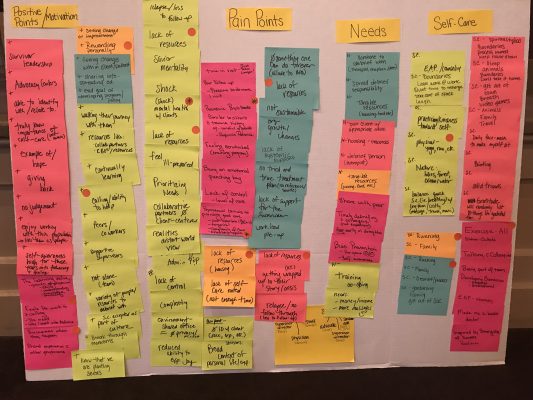Catalysts for Change
In our 2018 cycle of Catalyst, WEAVE staff learned about human-centered design, and used those strategies to come up with a plan to provide more support for direct service staff working with victims and survivors of sex trafficking.
WEAVE’s website defines sex trafficking as, “the recruitment, harboring, transportation, provision, or obtaining of a person for the purposes of a commercial sex act.” It is a problem without borders: there are an estimated 4.8 million people who are being sexually trafficked globally, according to the International Labor Organization. In the US, sex trafficking is widespread: Polaris, an organization that works to eliminate human trafficking around the world, has received reports of 34,700 sex trafficking cases in the US since 2007. Children, particularly runaways, those in the foster care system, and LGBTQ youth, are particularly vulnerable. Many children are trafficked from the age of 14, and even younger.
People who are sexually exploited experience complex trauma stemming from physical, emotional, psychological, and sexual abuse. Those who work to support survivors of sex trafficking often experience vicarious trauma and burn-out — there are high rates of job turnover for Service Providers.
Tabitha Thomas has witnessed this first hand as an Advocate and Program Director. She launched Creative Coaching — facilitation and coaching — to support Service Providers after working 10 years in the field at various crisis centers. Previously, she was the Director of Response Services with WEAVE where she was on staff for over three years and prior to that we was the Director of Counseling Services at SFWAR. Says Thomas, “Vicarious trauma and burn-out can manifest as we find ourselves preoccupied with our work, taking on too much, etc. For some it shows up as anxiety, moodiness, depression, insomnia. Others might compartmentalize and seem fine at work but go home and spend the weekend exhausted, unable to do the things they usually enjoy and/or can’t be present for their loved ones. Even the most committed people feel they can only do the job for so long.”
Thomas and other WEAVE staff members were determined to find ways to support direct service workers, with the goal of making the work less grueling and more sustainable.
Going to the Source
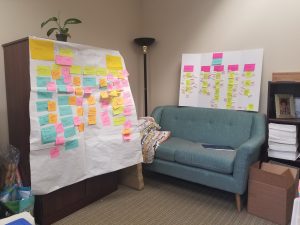
To get started, the WEAVE team engaged in brainstorming, journey mapping, and storyboarding. They decided that they needed to reach out to those in the trenches: people working directly with victims and survivors of sex trafficking. They created a flyer that they distributed to other WEAVE staff members, physicians, members of law enforcement, mental health workers, and direct service providers who self-identified as sex trafficking survivors. The flyer invited people to participate in a study, “to gain insight from Services Providers about the factors related to sustainability of their work with survivors/victims of sex trafficking.”
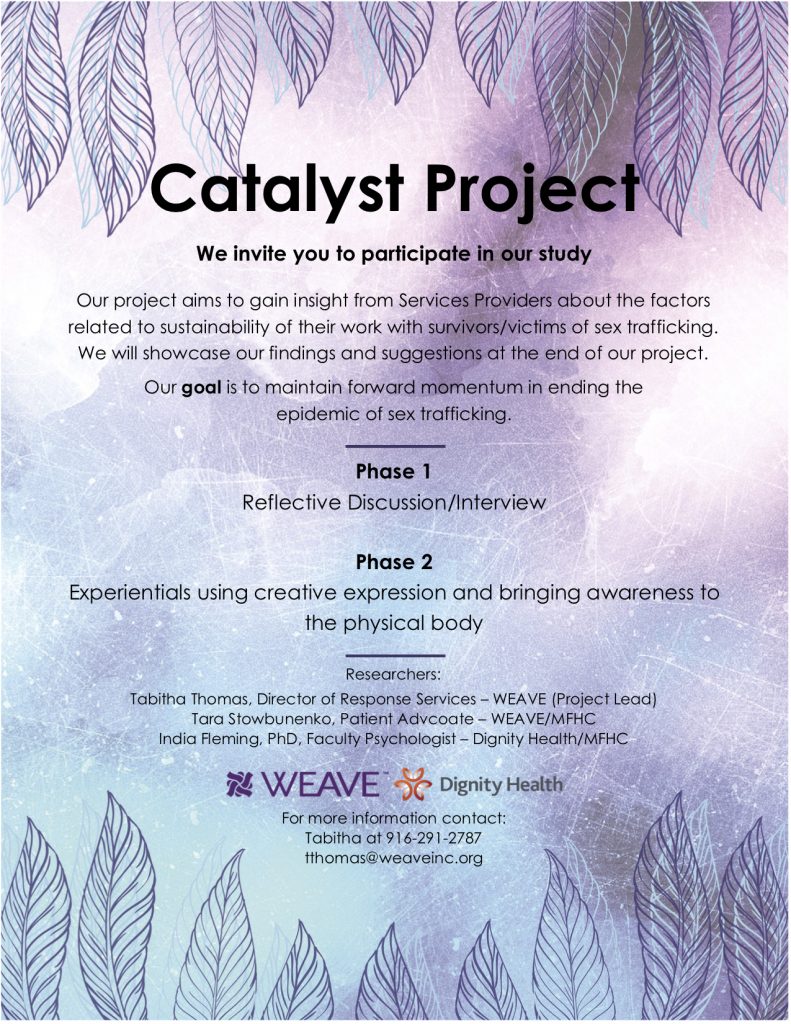
Study participants included:
- 9 physicians
- 5 mental health professionals
- 33 advocates
- 5 directors/managers
- 2 police officers
- 5 direct service providers who self-identified as survivors of sex trafficking.
The study, which provided a way for the team to See and Experience, had two phases: in the first phase, service providers participated in reflective discussions and interviews; in the second phase, they participated in exercises using guided imagery and creative expression.
The goal of the first phase was to encourage providers to talk openly and freely about their experiences in a safe environment, to reflect on the challenges they face in their day to day work, and to propose various solutions. Based on responses to interview questions, the team created word clouds that illustrate issues like pain points, positive points/motivation, needs, and self-care methods.
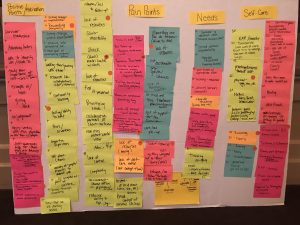

In the second phase, participants were led through a guided imagery exercise and then invited to use art materials to express what they’d experienced in the exercise.
The second phase of the study was designed by Tabitha Thomas, who has a background in art therapy and somatics; her goal was to encourage participants to engage in a different way than they might in verbal interviews. “These exercises elicited deeper conversations than the interviews did, and led to some ‘ah hah’ moments for participants,” according to Thomas. She says almost all the participants responded positively to the exercises, and said how important it was to take a pause and breathe. “Many of them said, ‘I can’t remember the last time I did that,'” says Thomas.
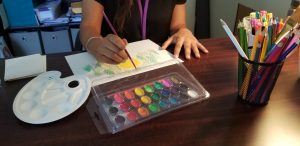
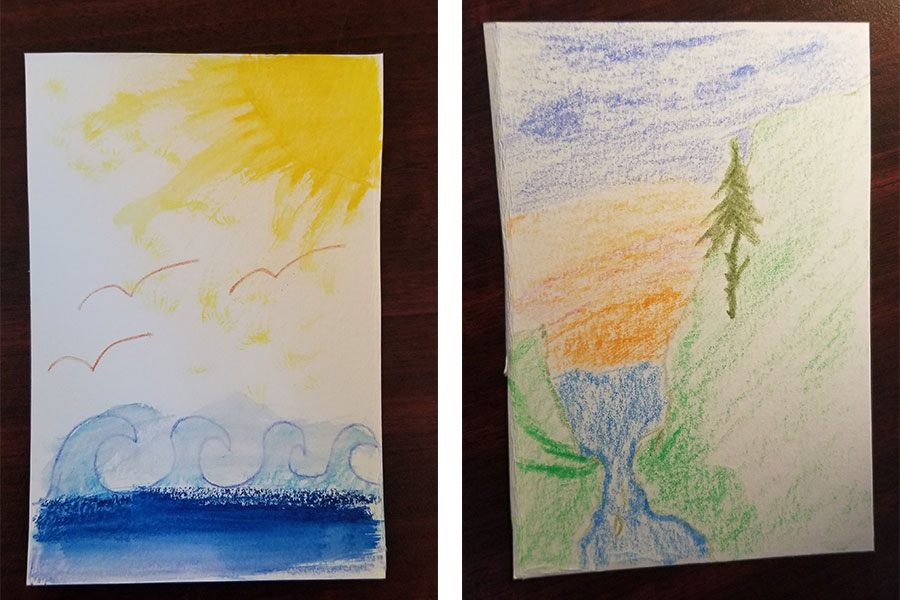
“The people who we serve want to be heard and they want to be believed. And to that end I think our staff want to be heard and they want to be believed, too, and to be supported. This activity is a good way to level the field just for a moment in time, to check in, because we should genuinely be caring for each other and seeing how we can work that field together better.”
— Anonymous Advocate
The Search for Answers
The participants’ positive responses to the study activities persuaded the WEAVE team that direct service staff would benefit from support beyond what they were already getting from their supervisors.
But what should this look support like?
During the Imagine and Model phase of the project, the WEAVE team analyzed the interviews and brainstormed ideas. They also held a co-design meeting to get input from others. They created a storyboard, developed a prototype, and presented it to WEAVE staff.
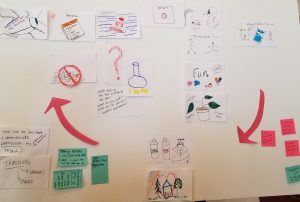
The team’s initial prototype was a response to the need for a “reset button,” a point raised by many study participants. The idea was to give staff members a “hall pass,” like those used in many schools. The hall pass would be a tangible reminder for staff to practice self care. Staff members could also use it to signal when they didn’t want to be interrupted. When they presented the idea, the team proposed that staff try the plan for a week and provide feedback; or, alternatively, they could make passes available and staff could use them or not, as they wished.
This prototype failed. The response from staff was not positive: many didn’t think it would work, and one in particular said it reminded her of grammar school, which was not a positive association.
After the rejection of the initial prototype, the team regrouped, did more brainstorming and mapping, and ultimately asked and received an extension of the project from CCI. Over the next few months, the team continued the exploration process, conducting research and holding co-design meetings with direct service providers. The team gathered additional insight and ideas at the annual conference of the California Coalition Against Sexual Assault (CalCasa) in August 2018. Tabitha Thomas gained still more ideas when she presented at the annual Sexual Assault Response Team (SART) Summit in September 2018 and attended other workshops.
The team came up with a second idea: to create a new position that would address the needs of direct service staff at WEAVE. The position, a Wellness and Inclusion Consultant, would provide individual support, create opportunities for peer support, and organize informational and training workshops to promote self-care practices. Having such a consultant on-site, they concluded, would ensure that the individual had an understanding of the organization, its mission, and the day-to-day work.
The word “inclusion” was added to the title because, during at least one co-design meeting, some WEAVE advocates talked about underrepresentation of minorities on the WEAVE staff and board of directors, in contrast to the organization’s diverse clientele. The new consultant, then, would also be charged with organizing trainings to counter implicit bias and related issues.
Throughout the process, WEAVE’s top administrators allowed the team the freedom to explore until they found the best solution. “We were surprised by the overwhelming support of leadership,” says Thomas. “This helped us feel comfortable addressing sustainability in a new and innovative way in our field.”
Results
WEAVE is now implementing the plan to hire a Wellness and Inclusion Consultant.
Tabitha Thomas, who resigned her position as WEAVE’s Director of Response Services in November, 2018, has been hired as a consultant to facilitate some wellness workshops in January and March, 2019, and to provide individual support to WEAVE staff members. Depending on funding, WEAVE hopes to build on these first steps and provide additional wellness and inclusion workshops going forward.
Lessons Learned
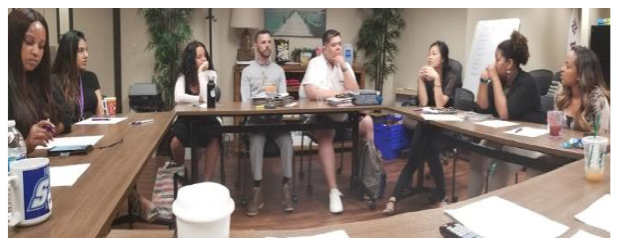
- Co-design meetings are essential: The meetings with WEAVE staff and other direct service providers helped the WEAVE team define the issues and generate energy and ideas.
- Accept failure without pushback: The WEAVE team was excited about their initial (hall pass) idea, but when staff didn’t like it, they didn’t cling to it or try to implement it despite objections. The team’s willingness to listen and explore other solutions helped build trust with other staff members, and made them feel heard.
- Be open to the unexpected: It turned out that diversity and inclusion were issues that were top of mind for some staff members, which the team was not anticipating. The team heard this feedback, and incorporated these concerns into their discussions and final plan.
Next Steps
- Dedicated staff/consultant hired for Wellness and Inclusion position: Tabitha Thomas has been hired as a consultant.
- The consultant will plan various offerings and schedule accordingly, and come up with a plan to make offerings available to all staff (at various times and in rotation).
- The consultant will facilitate and offer a variety of workshops, support groups, and other offerings. (Many direct service providers stressed the need for more opportunities to debrief in a variety of ways, and not only with their direct supervisors.)
- The consultant will create feedback forms and surveys to continue to incorporate staff input and ideas.
- The consultant will plan offerings for staff at all levels and departments at WEAVE, including direct services, HR, retail, and the front office.
- The consultant will track outcomes of the offerings.
- The consultant will share new tools on an ongoing basis.
Key Tools

